First Set Of Guidelines For Digital Lending : RBI

The Reserve Bank of India (RBI) issued the first set of guidelines for digital lending, to crack down on illegal activities by certain players.
- Towards addressing concerns that had sprung up, the RBI had constituted a Working Group on ‘digital lending including lending through online platforms and mobile apps’ (WGDL) in January, 2021.
- The group has proposed stricter norms for digital lenders in November 2021, some of which have been accepted and included in the new norms while others are under examination.
Digital Lending:
- It consists of lending through web platforms or mobile apps, by taking advantage of technology for authentication and credit assessment.
- Banks have launched their own independent digital lending platforms to tap into the digital lending market by leveraging existing capabilities in traditional lending.
Highlights of the Guidelines:
- All loan disbursals and repayments will be required to be executed only between the bank accounts of the borrower and the Regulated Entities (RE) without any pass-through or pool account of the Lending Service Providers (LSP) or any third party.
- Regulated Entities include a bank or a non-banking financial company.
- The new rules mandate that fees or charges payable to LSPs in the credit intermediation process will be paid directly by the bank or Non-Banking Financial Companies (NBFCs) and not by the borrower.
- All-inclusive cost of digital loans in the form of Annual Percentage Rate (APR) is required to be disclosed to the borrowers.
- The new norm prohibits any automatic increase in credit limit without the explicit consent of the borrower.
- It also provides, as part of the loan contract, a cooling-off/ look-up period during which the borrowers can exit digital loans by paying the principal and the proportionate annual percentage rate without any penalty.
- To protect data privacy, the data collected by digital lending apps has to be need-based, with the customer’s prior consent, and can be audited, if required.
- Banks will have to ensure that they, and the LSPs engaged by them, must have a suitable nodal grievance redressal officer to deal with fintech- or digital lending-related complaints.
- This officer will also deal with complaints against their respective Digital Lending Apps (DLAs).
- Current guidelines allow for the borrower to complain to the Integrated Ombudsman Scheme of the RBI if their grievance was not resolved by the bank within 30 days.
- REs are required to ensure that any lending done through DLAs has to be reported to Credit Information Companies (CICs), irrespective of its nature or tenor.
- More importantly, lending through the Buy Now Pay Later (BNPL) model also needs to be reported to CICs.




